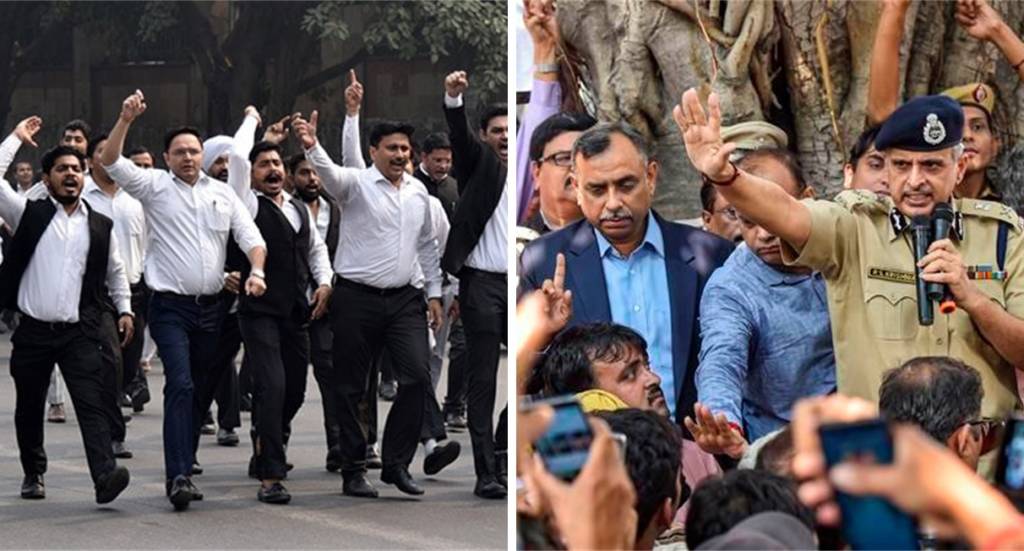Over the last few days, Delhi has witnessed an unprecedented deadlock in the form of repeated clashes between the Delhi Police and lawyers followed by protests from both sides. The tensions between the Delhi cops and lawyers were triggered by the November 2 incident when advocates and police clashed at the Tis Hazari Court complex. As per officers, the violent clash left 20 policemen, and several advocates injured. Many vehicles were also vandalised or set on fire. The clash had reportedly started over an argument between the police and the lawyers regarding the minor issue of parking.
It is unfortunate that a minor incident took shape of a violent clash and turned the Tis Hazari Court complex into a virtual battleground between the advocates and the Delhi Police. The Police and the lawyers have different versions of the incident. The lawyers claim that more of their colleagues were injured during the violent clash, and that police firing resulted in injuries to two lawyers. The police however claims that they had only fired in air.
As per the advocates, the lawyer’s car had allegedly hit a jail van, after which he was taken inside a lockup. Tis Hazari Bar Association Secretary Jaiveer Singh Chauhan said, “He was taken inside a lockup and beaten up badly. The SHO came but was not allowed inside. The district judges of the central and west district, along with six other judges went there but were unable to let the lawyer out.”
Police on the other hand said that a sentry had only requested the lawyer to park his car at a demarcated zone because it was obstructing the movement of prisoners’ vehicles. Additional PRO of the Delhi Police Anil Mittal said, “In protest a large number of advocates of the Tis Hazari Court assembled near the lockup. CCTV footage examined so far has shown that lawyers forcefully entered the lockup and started manhandling police officials.”
In what further aggravated tensions between the Delhi lawyers and cops, a video came up, a couple of days after the Tis Hazari clash, in which a group of advocates can be seen beating up a policeman who is riding a bike. One of the advocates can be seen slapping the policeman. The incident is said to have taken place outside the Saket Court. A clash also broke out between the two sides at the Karkardooma District Court in Delhi on Monday, two days after the Tis Hazari incident.
This is utterly shameful. Lawyers targeting, beating up and assaulting a policeman on duty outside Saket Court over what happened in Tees Hazari Court is unfortunate. @CPDelhi @DelhiPolice take strict action against these advocates. pic.twitter.com/Nq3T8M8CaV
— Munish Pandey (@MunishPandeyy) November 4, 2019
The Tis Hazari scuffle and other incidents of violence between the Delhi Police and lawyers resulted in a virtual stand-off between the two sides. Thousands of Delhi Police personnel, along with their families, staged an unprecedented 11-hour long protest at the police headquarters. They sought the arrest of lawyers involved in the clash. They finally called off their protest after an assurance by senior Delhi Police officers that their grievances will be redressed. As a precautionary measure, a company of the Central Reserve Police Force (CRPF) was deployed outside the Delhi Police headquarters on Wednesday.
Meanwhile, the lawyers’ strike in protest of the Tis Hazari clash continued on Wednesday as well, across all six district courts of Delhi. At Saket Court, the lawyers shut the main gate of the Court forcing several litigants who had come to the Court for their matters to stay outside. Rohini Court witnessed a couple of unfortunate incidents with an advocate allegedly trying to self-immolate and another one trying to jump from the 14th floor of the court building.
The fact that Delhi Police and lawyers- institutions which form an indispensable part of the criminal justice system goes on to show that the situation is rather grim in Delhi. As observed by the Delhi High Court, “in our democratic polity, the Bar and the Police establishment represent and constitute, as it were, the preserver, and the protector, of the rule of law.” The Court also stated, “They are but two faces of the coin of justice.” The Delhi High Court has also urged the representatives of the Delhi Police and advocates to hold a joint meeting to “sort out their differences amicably.”
The approach taken by the Delhi High Court ought to be appreciated. The fact remains that the Police and the Bar perform complementary functions in administration of justice. The criminal justice system cannot work effectively if either of these institutions fails to deliver properly. It is also indispensable that the two institutions are in harmony with each other, and any tensions or conflict between the two is bound to hamper the functioning of the criminal justice system. Ultimately, it is the ordinary citizen who would suffer of the police and the Bar share a prolonged tense relation.
As is clear from even the ongoing stand-off. The Delhi Police has called off its protest, however the very idea of the police going on protest is dreadful given that it can potentially imperil the law and order situation of the city. Similarly, if the advocates go on strike demanding justice, then how will the ordinary citizens get justice. It is a peculiarly unfortunate situation where those who are supposed to get justice for ordinary citizens are themselves on strike demanding justice. A situation where these institutions fall apart due to a conflict between them is even worse. Once the ongoing stand-off is diffused, the top brass of the Delhi Police and senior members of the Bar Association must get together and chalk out a strategy on how to ensure that the two institutions function in harmony, in order to avoid a similar situation in the future.
